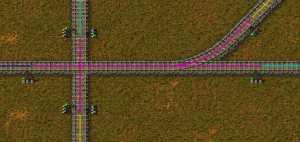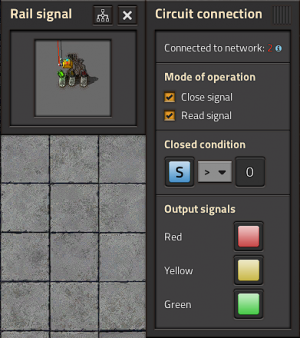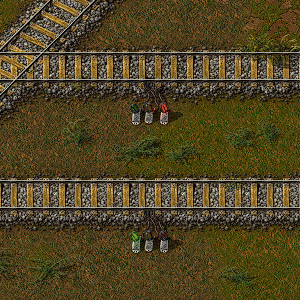Rail signal: Difference between revisions
Changed links going to the redirect Diesel_locomotive to go to Locomotive. |
Reordering with 1.1 |
||
| (24 intermediate revisions by 7 users not shown) | |||
| Line 2: | Line 2: | ||
{{:Infobox:Rail signal}} | {{:Infobox:Rail signal}} | ||
The '''rail signal''' divides rails into ''blocks'' and allows [[ | The '''rail signal''' divides rails into ''blocks'' and allows [[locomotive]]s to react to other locomotives allowing multiple trains use the same rails without colliding. Blocks span all connected rails regardless if a train can actually travel between them. Rail signals can also be used in with conjunction [[rail chain signal]]s, which also separate rails into blocks. In addition to the explanation on this page, there is also the [[Tutorial:Train_signals|rail signal tutorial]]. | ||
[[File:Rail_blocks.png|thumb|Signals dividing rails into blocks. Each block is highlighted with a different color.]] | [[File:Rail_blocks.png|thumb|Signals dividing rails into blocks. Each block is highlighted with a different color.]] | ||
== Direction == | == Direction == | ||
Which block a signal monitors depends on which side of a rail it is placed. When a signal is on the right-hand side of the track it monitors the block | Which block a signal monitors depends on which side of a rail it is placed. When a signal is on the right-hand side of the track, it monitors and protects the rail block behind it, up to the next signal or the end of the track. When placing rail signals, the rail signal blocks will be visible, and the opposite signal position will be highlighted in white. A train in automatic mode will not drive on a track if it would pass a signal on the left side unless there is also a signal on the right side at that signal. | ||
== States == | == States == | ||
[[File:railsignal_anim.png]] | |||
Rail signals have four states: | Rail signals have four states: | ||
* <span style="color:# | * '''<span style="color:#55FF55">Green</span>''' - The monitored block is empty. | ||
The monitored block is empty. | * '''<span style="color:#FFFF55">Yellow</span>''' - A train is not able to stop before the monitored block and will pass the signal. The [[debug mode|debug option]] <code>show-train-braking-distance</code> can be used to see the distance locomotives need to stop. A yellow signal means that a train is approaching and already has the approval to enter the following block. The block is reserved for a train and all other entrance signals of that block turn red. | ||
* <span style="color:# | * '''<span style="color:#ee7777">Red</span>''' - The monitored block is not empty or another signal monitoring it is yellow. | ||
A train is not able to stop before the monitored block and will pass the signal. The [[debug mode|debug option]] <code> | * '''<span class="rail-signal-blink">Blinking</span>''' - The signal is not on a rail, or the monitored block is also the block before the signal. | ||
* <span style="color:# | |||
The monitored block is not empty or another signal monitoring it is | |||
* Blinking | |||
The signal is not on a rail or the monitored block is also the block before the signal. | |||
When a signal is red locomotives will stop before it. A | When a signal is red, locomotives will stop before it. A rail chain signal can be used to make locomotives stop earlier, as they will always mimic the signal of what is in front of them. | ||
== Circuit network == | == Circuit network == | ||
| Line 26: | Line 24: | ||
A circuit network condition can be configured that when true will make the rail signal red. | A circuit network condition can be configured that when true will make the rail signal red. | ||
A rail signal can also output three different signals depending on if it is in its green, | A rail signal can also output three different signals depending on if it is in its green, yellow or red state. If a rail signal is red because of a circuit network condition the rail signal won't output a circuit network signal. | ||
== History == | == History == | ||
| Line 57: | Line 52: | ||
* [[Rail chain signal]] | * [[Rail chain signal]] | ||
* [[Railway]] | * [[Railway]] | ||
* [[ | * [[Tutorial:Train signals]] | ||
{{LogisticsNav}} | {{LogisticsNav}} | ||
{{C| | {{C|Railway}} | ||
Latest revision as of 15:19, 19 March 2021
| Rail signal |
|
Recipe |
|||||||||||||
| ++ → | |||||||||||||
|
Total raw |
|||||||||||||
| ++ | |||||||||||||
|
Map color |
|||||||||||||
|
Health |
|
||||||||||||
|
Stack size |
50 |
||||||||||||
|
50 (1 stack) |
|||||||||||||
|
Mining time |
0.1 |
||||||||||||
|
Prototype type |
|||||||||||||
|
Internal name |
rail-signal |
||||||||||||
|
Required technologies |
|||||||||||||
|
Produced by |
|||||||||||||
Object description
The rail signal divides rails into blocks and allows locomotives to react to other locomotives allowing multiple trains use the same rails without colliding. Blocks span all connected rails regardless if a train can actually travel between them. Rail signals can also be used in with conjunction rail chain signals, which also separate rails into blocks. In addition to the explanation on this page, there is also the rail signal tutorial.

Direction
Which block a signal monitors depends on which side of a rail it is placed. When a signal is on the right-hand side of the track, it monitors and protects the rail block behind it, up to the next signal or the end of the track. When placing rail signals, the rail signal blocks will be visible, and the opposite signal position will be highlighted in white. A train in automatic mode will not drive on a track if it would pass a signal on the left side unless there is also a signal on the right side at that signal.
States
Rail signals have four states:
- Green - The monitored block is empty.
- Yellow - A train is not able to stop before the monitored block and will pass the signal. The debug option
show-train-braking-distancecan be used to see the distance locomotives need to stop. A yellow signal means that a train is approaching and already has the approval to enter the following block. The block is reserved for a train and all other entrance signals of that block turn red. - Red - The monitored block is not empty or another signal monitoring it is yellow.
- Blinking - The signal is not on a rail, or the monitored block is also the block before the signal.
When a signal is red, locomotives will stop before it. A rail chain signal can be used to make locomotives stop earlier, as they will always mimic the signal of what is in front of them.
Circuit network

A circuit network condition can be configured that when true will make the rail signal red.
A rail signal can also output three different signals depending on if it is in its green, yellow or red state. If a rail signal is red because of a circuit network condition the rail signal won't output a circuit network signal.
History
- 0.13.0:
- The rail signal is now connectable to the circuit network.
- Halved the mining time of the rail signal.
- Rail signal stop placement indicator added.
- 0.11.4:
- Rail signal that fails to divide two sections of rail will blink multiple colors.
- 0.9.0:
- Players no longer collide with the rail signal.
- 0.5.0:
- Players can now see a visualization of the protected rail area when building/selecting the signal.
- 0.4.1:
- Rail signals connect to more than one rail when connected to a junction.
- 0.4.0:
- Introduced

